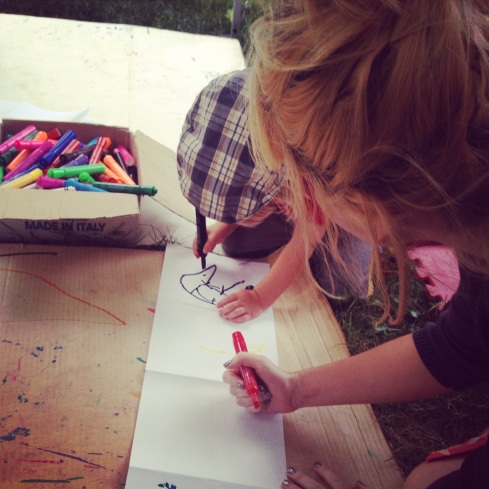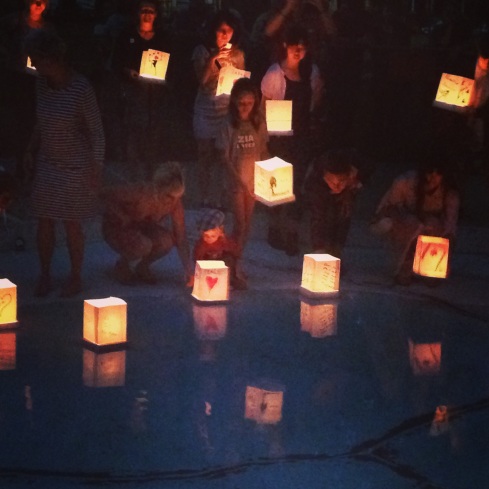I have never not been a worrier.
I can’t remember a time when the unappeasable spectre of What If wasn’t buried somewhere deep in my brain. It’s been there since before I can remember; certainly before I had any real names for it. Before I had words like anxiety or apprehension or intrusive thoughts, it was there, shivering and electric.
I say never not instead of always, because the former implies the possibility of an absence.
As a kid, I was obsessed with the binary of good/bad. There were good kids, like Heather, who smiled and ate everything on her plate and did whatever she told and never seemed to feel squinched up and mean inside. Then there were kids like Jay, who used art time exclusively to draw pictures of penises urinating some kind of black tar-like substance. It seemed pretty clear to me early on which side of the line I was on: I struggled to behave and do what was expected of me, and also I thought Jay’s dick pics were hilarious. I didn’t want to be a bad kid, but it seemed like I didn’t have a choice; it was a sort of malignancy that grew and grew in me, no matter what I did. I tried not to talk too much or interrupt or fidget, but my efforts lasted an hour or two at most. And meanwhile Heather smiled serenely, secure in the knowledge that she would never feel the impulse to scrawl a pair of hairy testicles across a pink sheet of construction paper.
I wish I could say I accepted my badness with glee, but I didn’t. Instead, I thought about how all of my teachers must hate me. Sometimes it was all I could think about, although that didn’t stop me from doing bad things.
I stopped sleeping the summer I turned seven, because I was sure that I would die in my sleep. I became obsessed with the idea that I might stop breathing and, if I wasn’t awake, wouldn’t be able to think myself into taking a breath again. How was I supposed to trust my fluttering, fragile body to take care of itself through the long, black hours of sleep? I remember the nights stretching out lonely and miserable in front of me and wishing so hard that I could just be unconscious. I didn’t want to play. I didn’t want to read. I didn’t even want to watch TV. I just wanted to not think about dying every time I closed my eyes. I thought up funny ways to try to alleviate my anxiety – like holding my breath until I passed out (which didn’t work), or sleeping in the hallway so that if I did stop breathing one of my parents could find me and quickly resuscitate me (this just meant that I got tripped over a lot). Nothing worked.
And then one day the fear went away as easily as it had come.
I used to love the high that worrying gave me – the hours before a test or a recital when I would ride the wave of glittering panic, my fingers and toes tingling with anticipating. Then I would feel the heavy needle of my anxiety shift into its groove as I sat down at my desk or stepped out onto the stage, and with my adrenaline-flushed cheeks I would outshine everyone else. Worrying made me a superbly good performer. Afterwards I would crash, hard. There was never a moment of triumph, no feeling of success – only a weepy, high-strung post-performance haze.
When I was older, I started making up rituals – they were for “good luck” I said, although what I really meant was that if I didn’t do them I would have bad luck. One of them involved spelling out a series of words in sign language; I would do this either behind my back or next to my thigh whenever I thought about it, which was often. Another had something to do with running from the fridge to the dining room table and back again before the fridge door closed – if I was able to do this even just once while setting the table, then none of the things I worried about would happen. I fully gave myself over to magical thinking, because even thought I knew logically that doing these things wouldn’t change my luck, I couldn’t stop the What If machine in my head. I still can’t stop it – it’s whirring and buzzing in my head as I type this, speeding up my clunking thoughts just as I should be settling down for the night.
I wish I could tell you that there’s an end to anxiety. I wish I could say that I took a pill or discovered the healing power of long walks or learned transcendental meditation, but none of that would be true. Every day this awful beast scoops me up in its huge maw and shakes me until my bones clink together. Some days I can outrun him for longer than others, but there’s never a time when he doesn’t catch me.
I am still an excellent performer, and I still crash and cry afterwards. I jitter and skitter through my days, gritting my teeth through the intrusive thoughts until I can drug myself to sleep at night. By now, this is the only way I know how to manage things; it’s a system of sorts. although it doesn’t offer much relief.
I can’t say what my life would look like without anxiety, but I know that even with it, I’ve managed to create something good. That might sound absurdly hopeful, but I can’t help it. The only way to live with it is to be absurd about it, even in the face of all the known facts. So I pace and cry and don’t sleep and drag myself to therapy and take my pills and believe so hard in never-not instead of always. The idea that this jolting misery could be here forever is unbearable, so I stick with never not when I can.
I have never not lived like this.
But I could someday.
Maybe.


























